Decoding MS Notice 11 of 2024: Safeguarding Seafarers' Rights and Ensuring Ethical Maritime Practices

A few days ago, we published a story, "Decoding DG Shipping India's Circular on BSID Implementation and Renewal," which received a significant response from our readers. Many readers suggested that we should also decode and simplify MS Notices from DG Shipping to help the Indian and global maritime community stay updated.
Knowledge is key, isn’t it?
Today, in this blog post, we will decode MS Notice 11 of 2024, regarding actions against Recruitment & Placement Services (RPS) agencies and seafarers for utilizing deceitful practices. Our aim is to help the maritime community understand this important notice.
The original copy of the notice and its download link are available at the end for better review and immersive learning.
MS NOTICE 11 OF 2024
Number: F. No. 23-CIR/1/2024-CREW-DGS
Date: 03.06.2024
Subject of Notice: Action against Recruitment & Placement Services (RPS) agencies and seafarers for utilizing deceitful practices.
Many of our readers have expressed that they don’t have enough time to go through our detailed posts. Considering the importance of understanding this MS Notice, we have summarized this blog into interactive flashcards for a quick review. Just click the Flash icon on the right-side tab to access them.
An Introduction
Indian seafarers are recruited to serve on merchant shipping vessels either directly by ship-owners or through Indian registered Recruitment and Placement of Seafarers (RPS) agencies.
Implementation of MLC Standards in Seafarer Recruitment and Placement
With the MLC Convention in force, the recruitment and placement of seafarers fall within the purview of the Merchant Shipping (Recruitment and Placement of Seafarers) Rules, 2016. India, having ratified the MLC Convention 2006, has accordingly promulgated the Merchant Shipping (Maritime Labour) Rules, 2016, and the Merchant Shipping (Recruitment and Placement of Seafarers) Rules, 2016.
These rules ensure that the recruitment and placement of seafarers adhere to international standards set forth by the MLC, thus safeguarding the rights and welfare of seafarers in the maritime industry
Example: A seafarer recruited through an RPS agency is guaranteed fair wages, timely payments, and secure working conditions, as per the standards of the MLC 2006.
The Key Regulations
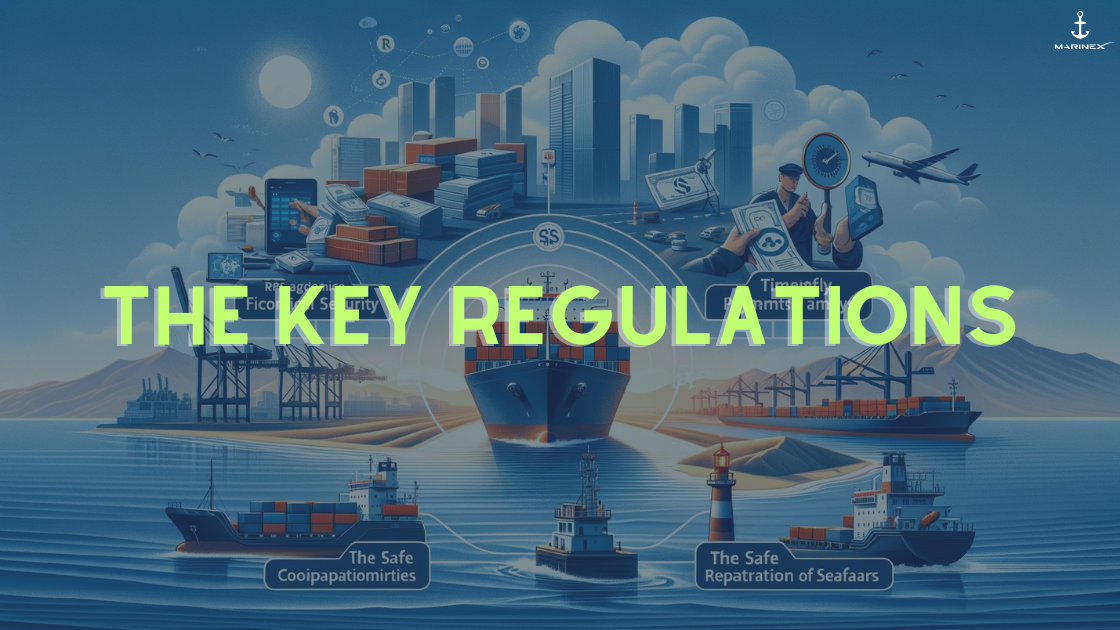

The Recruitment and Placement Services (RPS) agencies have various obligations concerning the payment of wages, abandonment, and repatriation of seafarers, as outlined in the Maritime Labour Convention (MLC) 2006 and its associated guidelines. Key regulations include:
Regulation 2.2 of MLC 2006
Seafarers are entitled to be paid wages as agreed in their employment agreements, and payment should be made regularly and directly to them. RPS agencies must ensure that seafarers receive their wages promptly and without unauthorized deductions.
For example, a seafarer on a container ship expects to receive their full salary every month, directly deposited into their account, ensuring they can meet their financial obligations back home.
Regulation 2.5 of MLC 2006
Shipowners are responsible for the repatriation of seafarers in the event of abandonment. If the shipowner fails to fulfill this obligation, RPS operating in a member’s territory must ensure that seafarers are repatriated at the shipowner's expense, in accordance with Standard A2.5 MLC 2006.
For instance, if a seafarer is left stranded in a European port without resources, the RPS agency must organize their travel back to India, covering all associated costs.
Standard A2.5 of MLC 2006
RPS agencies must ensure that seafarers receive financial security in the event of the shipowner's insolvency or abandonment.
This may include providing access to financial security systems such as insurance or other equivalent measures to compensate seafarers for unpaid wages and repatriation expenses.
For example, an RPS agency might activate an insurance policy that compensates the seafarers for unpaid wages and covers their travel expenses back to their home country.
RPS Companies' Responsibilities and Cooperation with Authorities
RPS Companies must cooperate with competent authorities in overseeing and enforcing regulations related to payment of wages, abandonment, and repatriation.
This includes providing necessary information and assistance during investigations or proceedings concerning these matters.
For instance, if a seafarer files a grievance regarding delayed payments, the RPS agency must submit all relevant payroll records and employment agreements to the investigating authorities.
Key Provisions of the Merchant Shipping (Maritime Labour) Rules 2016


The Merchant Shipping (Maritime Labour) Rules 2016 outline various rules and provisions, in line with the Maritime Labour Convention, 2006, to protect the rights and interests of seafarers. Key sections include:
Section 2: Monthly Payments and Family Remittance
Shipowners must pay seafarers at least monthly, as per agreements. Seafarers should receive a monthly account of payments, including wages and additional payments.
Shipowners must facilitate the transfer of earnings to seafarers' families, including allotment systems for remittance via bank transfers or similar means.
For example, a seafarer working on an oil tanker can arrange for a portion of their salary to be sent directly to their spouse's bank account to cover household expenses.
Section 4: Employment Agreements and Access
Seafarers must have a signed original copy of the Employment Agreement. Shipowners or licensed recruitment services must submit signed agreements with the relevant authority.
Copies of collective bargaining agreements must be on board and in English, and seafarers must have access to repatriation provisions in English.
For instance, a seafarer on a bulk carrier has access to a clearly written employment agreement and repatriation terms, ensuring they understand their rights and obligations.
Are you a proud Marine Engineer?
Buy this T-shirt and flaunt your profession!
Use coupon code MARINEX20 for a 20% discount. Hurry, limited time offer and limited stock!
(Visit MarineX Store)
Section 5: Financial Security for Repatriation
Shipowners must provide financial security to ensure repatriation of seafarers. Seafarers are entitled to repatriation at no cost under certain conditions, including employment termination, inability to perform duties, compassionate grounds, or abandonment.
Abandonment includes failure to cover repatriation costs, lack of maintenance, or non-payment of wages for two months. Shipowners cannot charge seafarers for repatriation costs, except in default cases.
For example, a seafarer on a container ship suffering a severe illness would be repatriated at the shipowner's expense, ensuring they receive medical care and can recuperate at home.
Section 8: Repatriation Arrangements
Shipowners are responsible for making arrangements for the repatriation of seafarers.
For instance, a seafarer finishing their contract on a cruise ship will have their travel arrangements made and paid for by the shipowner, ensuring a smooth transition back home.
Current Issues in Maritime Recruitment
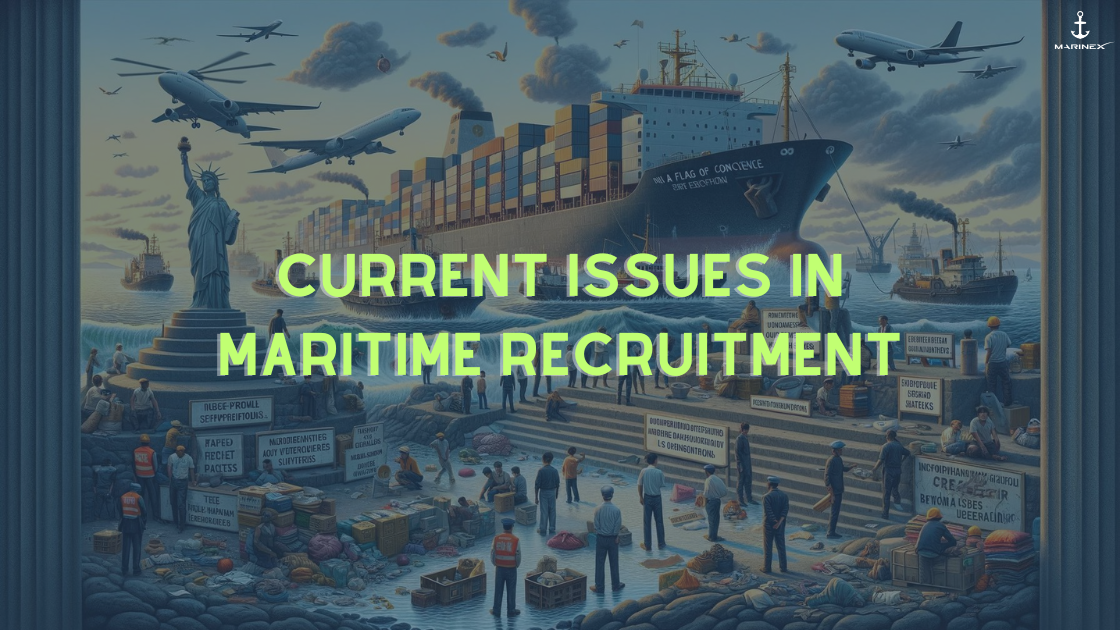
Abandonment and Stranding of Seafarers

The Directorate has received various incident reports of Indian seafarers abandoned or stranded at foreign ports on foreign-flagged ships, often without wages for months and lacking essential provisions and fresh water on board.
Many of these incidents involve vessels flying Flags of Convenience (FoC) with regulatory lapses and are found to be in serious non-compliance with the mandatory provisions of MLC 2006.
These reports also suggest that seafarers are made to join substandard vessels different from the ones they were initially recruited for.
For instance, a seafarer on a FoC vessel might find themselves stuck in a remote port without access to food, water, or medical care, forcing them to rely on local charities or their own resources to survive.
Fraudulent Activities by RPS Agencies
Instances and complaints regarding fraudulent activities carried out by some Recruitment and Placement Service (RPS) agencies have been received.
These complaints indicate that RPS agents are employing deceptive methods to lure seafarers by employing touts/agents to show seafarers a promising ship profile and generate Form 1 for a lucrative vessel.
However, once the seafarer's e-migration is processed at the immigration check post, they are assigned to a different vessel, which is often found to be substandard.
For example, a seafarer expecting to join a new cargo ship with modern amenities is instead placed on an aging vessel with poor safety records and inadequate living conditions, leading to significant hardship and safety concerns.
Non-Reporting of Vessel Changes by Seafarers
Seafarers often do not report incidents of being onboard a different vessel than the one for which their Form 1 was generated. These vessels are often substandard, and seafarers reluctantly work on these inferior ships due to the pressing need to meet their sea service requirements.
For instance, a seafarer might continue working on a dilapidated vessel with safety hazards because they need the sea time for career progression or to fulfill contractual obligations, putting their health and safety at risk.
Submission of Fake Documents by RPS Agents
Additionally, there are reports of RPS agents submitting fake documents, including Protection & Indemnity (P&I) certificates, employment agreements, and copies of Collective Bargaining Agreements (CBAs) that are not genuinely signed between ship-owners and seafarers' unions.
These fraudulent documents lead to seafarers being placed on substandard vessels with expired P&I certificates, compromising their safety and well-being.
For example, a seafarer might join a ship believing it has valid insurance and regulatory compliance, only to find out that in case of an accident or emergency, there is no financial protection or legal recourse available.
Actions to be Taken Against Fraudulent RPS Practices
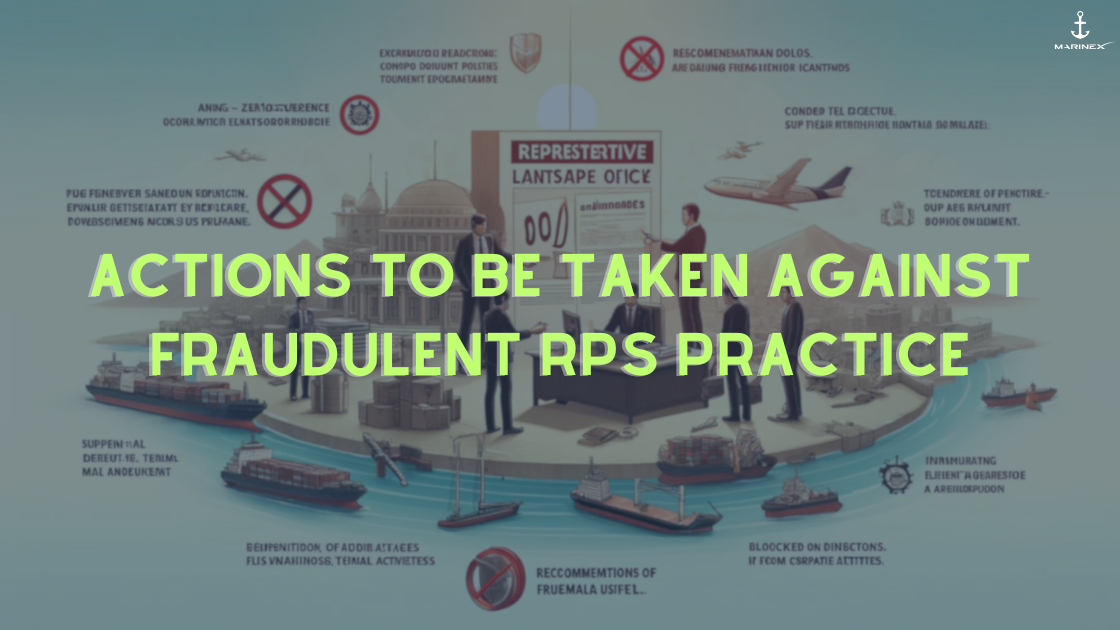

Implementation of Zero-Tolerance Policy
To address the increasing reports of fraudulent practices by some RPS agencies, this Directorate office will implement a zero-tolerance policy towards any RPS agency found engaging in fraudulent practices, such as misrepresenting ship assignments, generating fake documents, and submitting falsified documents, including P&I Certificates and Collective Bargaining Agreements (CBAs)
For instance, if an RPS agency is caught issuing counterfeit insurance certificates to seafarers, its operations will be halted, its license revoked, and it will be subject to legal proceedings and penalties.
Examination of Document Authenticity
The Directorate is examining the authenticity of online submitted documents such as MLC details, P&I Certificates, Collective Bargaining Agreements (CBAs) in the E-Governance portal by RPS agencies.
Any RPS agency found to be involved in fraudulent activities will face the following actions:
Example: The RPS agency’s access to the DG Shipping online portal is revoked upon discovery of fake documents. For instance, if an agency submits forged documents through the E-Governance portal, its online access will be blocked, preventing it from processing further recruitments.
Example: An RPS agency undergoes a comprehensive audit, revealing widespread fraud and leading to its operations being shut down. For example, detailed investigations might uncover systemic issues and repeated fraudulent practices, resulting in the agency's permanent closure.
Example: An RPS agency loses its license permanently after being found guilty of fraudulent recruitment practices. For instance, an agency involved in falsifying seafarer contracts and misrepresenting vessel conditions will have its license revoked, barring it from future operations.
Example: The directors of a fraudulent RPS agency are banned from working in the maritime industry for five years. For instance, if an agency director is found complicit in illegal activities, they will be prohibited from holding any position within the maritime sector for a substantial period.
Recommendations to Ministry of Corporate Affairs
Recommendation of the matter to the Ministry of Corporate Affairs (MoCA), Govt. of India, for further necessary actions as per the Company’s Act, such as blacklisting of RPS agency Directors' DIN numbers and not allowing them to carry out any business activities in India for five years.
Further Actions and Enforcement
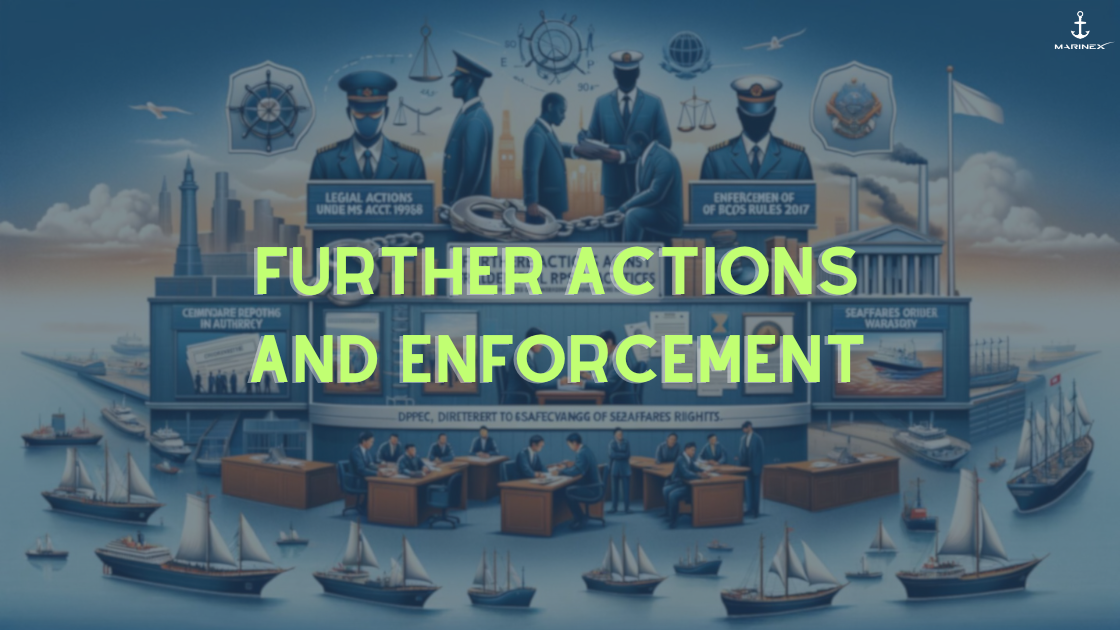

Legal Proceedings Under MS Act 1958 and RPS Rules 2016
- Initiation of Legal Actions
- Prosecution for Violations
- Ensuring Compliance and Accountability
For instance, an agency that repeatedly violates recruitment regulations will face prosecution under maritime laws, ensuring compliance and accountability.
Reporting of Fraudulent Activities by Seafarers
- Mandatory Reporting
- Consequences for Non-Reporting
- Enforcement of CDC Rules 2017
Indian seafarers are hereby reminded to immediately report any such fraudulent activities. Failure to report such incidents and utilizing fraudulent means to obtain sea service on ships not actually sailed on will result in serious consequences, such as blocking of seafarers' Indos No., including cancellation, withdrawal, or suspension of their Continuous Discharge Certificate (CDC) under the provisions of the MS CDC Rules 2017.
Non-compliance with reporting requirements and engagement in fraudulent practices will be strictly penalized to uphold the integrity of the maritime profession.
Commitment to Safeguarding Seafarers' Rights
- Upholding Seafarers' Rights
- Maintaining Recruitment Integrity
- Zero Tolerance for Fraudulent Activities
This Directorate is committed to safeguarding the rights and well-being of seafarers and maintaining the integrity of the maritime recruitment process.
All RPS agencies are hereby warned that any involvement in fraudulent activities will be dealt with severely and will not be tolerated under any circumstances.
For instance, any agency found engaging in deceitful practices will face immediate suspension, legal prosecution, and permanent debarment from the maritime sector.
The Original Notice
Please visit the DG Shipping website to view this notice, or you can also download it from the link below.
Significance of MS Notice 11 of 2024 for Seafarers and Maritime Professionals
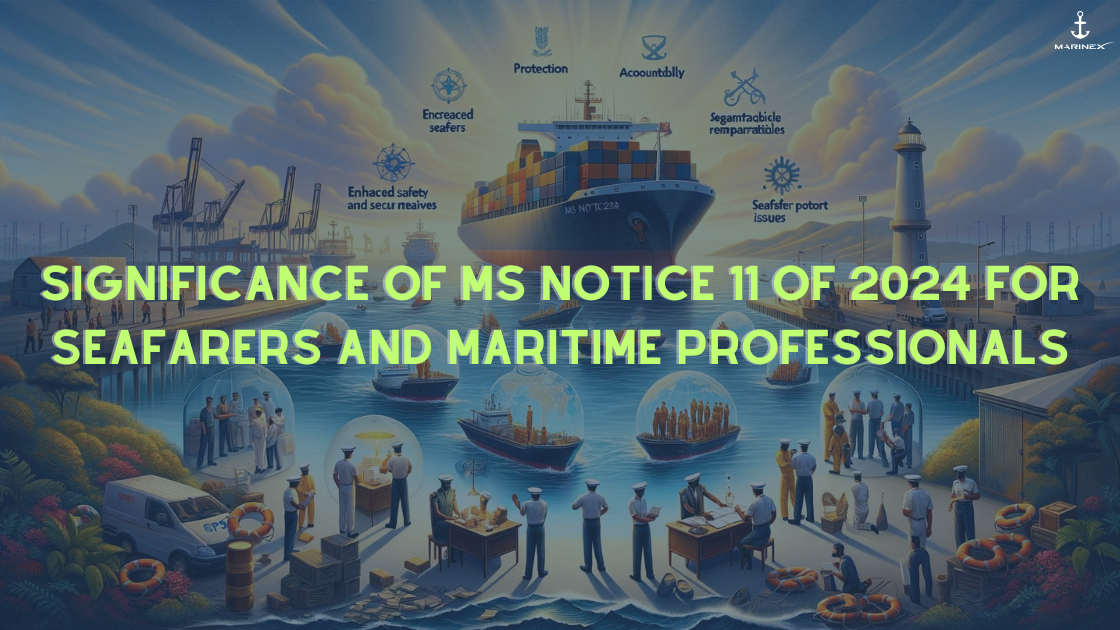

Protection of Seafarers' Rights
This notice emphasizes the enforcement of regulations that protect the rights of seafarers, ensuring they receive their agreed wages promptly and have financial security.
For seafarers, this means better working conditions, timely payments, and assurance of their rights being upheld.
To read complete blog subscribe to our premium plans